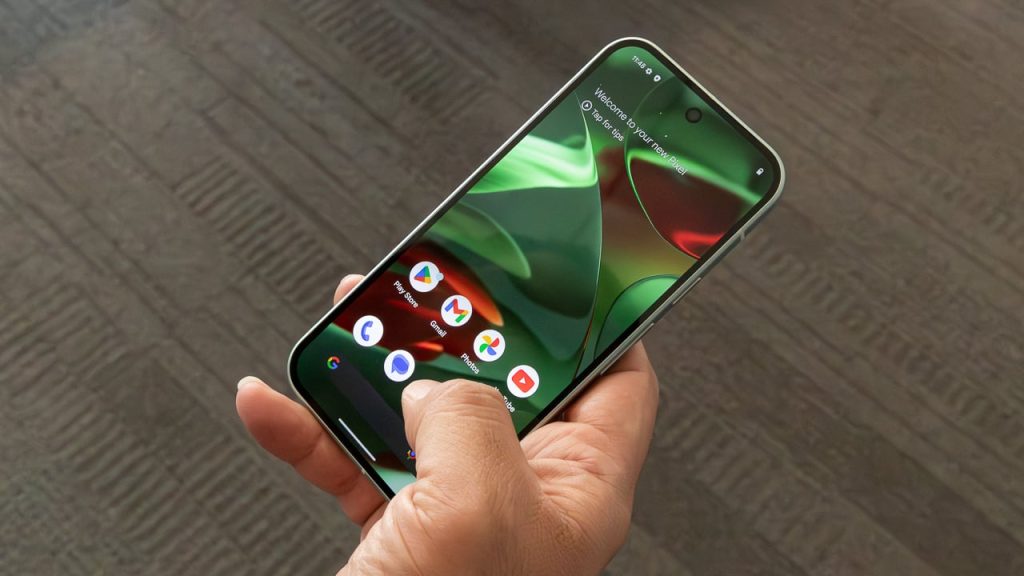The new Google Pixel 9 is teeming with AI — and I don’t feel any differently about it now than I did a year ago.
That is to say, when I looked at the Google Pixel 8 and Pixel 8 Pro phones last year, I came away thinking Google was focusing on the wrong things. After years of every new Pixel generation introducing genuinely useful features like live transcription in the Recorder app and tons of camera trickery, the Pixel 8 generation brought us a bunch of novel (but ultimately useless at best and vile at worst) AI features.
That approach has only changed a little in 2024 with the Pixel 9. Google’s entry-level flagship is $100 more expensive than the Pixel 8 at $799 — and for that price you get more RAM, better cameras, and most notably, a bundle of even more new AI features that left me wondering why anyone would use them at all.
This is still a very solid Android phone, but Google’s foray into AI are starting to feel like the kinds of manufacturer-specific bloatware you used to buy Pixel phones to avoid.
Google Pixel 9 price and specs
I’ve already established that the Pixel 9 got a $100 price bump from last year up to $799.
Credit: Joe Maldonado/Mashable
But here’s specifically what that gets you:
Google Tensor G4 chip
12GB RAM
128GB storage
6.3-inch display
The only hardware variant for Pixel 9 is a 256GB model that adds an extra $100 onto the price tag. Aside from the new Tensor chip (which has become a standard expectation for each new Pixel phone at this point), the biggest upgrade over the Pixel 8 here is 12GB of RAM, up from 8GB last year.
That should theoretically allow the phone to handle more tasks at once, but really, it’s there for AI features. We’ll get to those in a bit.
Opens in a new window
Google Pixel 9 design
The most important thing to know about the Pixel 9, design-wise, is that it comes in a pink, or “Peony,” this year. Excellent work by Google. Our review unit wasn’t pink, and I’m very jealous of those who manage to get their hands on the Peony model. The other available colors are the much less striking Porcelain, Wintergreen, and Obsidian choices.
Credit: Joe Maldonado / Mashable
As for design changes, Google went with flat, aluminum sides going around the phone, as opposed to the curved surfaces on the Pixel 8. I don’t love this. It makes the Pixel 9 less ergonomic in the hands, and I constantly feel like I have less grip on it than I would a phone with curved sides.
Whether it’s actually in danger of falling out of my hands and onto the cement or not, you never want a phone that feels that way.
The only other major design change worth noting is that the old side-to-side camera bar on the back has been replaced by a horizontal, oval-shaped camera bump that looks more like something you’d see on other phones. It’s less distinctly Pixel than before, but I wouldn’t say it looks bad. Just different.
Google Pixel 9 display
While I have misgivings about other aspects of the Pixel 9, the improved display is not one of them.
Credit: Joe Maldonado/Mashable
Google bumped the max brightness up from 2,000 nits on Pixel 8 to 2,700 nits on Pixel 9, making this a great phone for use outside on a sunny day. While walking around my neighborhood, I never had trouble seeing the screen, which has become a problem for my slightly older iPhone.
The adaptive 60-120Hz refresh rate that graced last year’s entry-level Pixel is back and unchanged, which is for the best. As recently as the iPhone 15, Apple’s equivalent handsets (as in the non-Pro models) are still locked at 60Hz. Google (as well as most other competitors at this point) continues to lap Apple in this regard.
Oh, and you get an extra tenth of an inch compared to the Pixel 8. The Pixel 9’s display is 6.3-inches, while the Pixel 8’s was 6.2-inches.
Google Pixel 9 AI features
So far, I’ve established that this is a phone with good specs and a nice display. I don’t love the way it feels in my hands, but hey, you can always buy a case. Now, it’s time to get into what I dislike about Pixel 9: its excessive reliance on AI features.
Just like how the Pixel 8 introduced the Magic Editor feature for quick-and-dirty photo edits, the Pixel 9 brings with it around half a dozen new toys to play with, of varying levels of usefulness. By that, I mean they vary from “inoffensive” to “I don’t know why this exists.”
For instance, you can use the Reimagine feature in Magic Editor to take a photo of a street and use AI to turn the street into a river. Or you can use Add Me to create group photos that never really happened because one person had to hold the camera.
Credit: Kimberly Gedeon/Mashable
There’s also a new native Pixel Weather app that is mostly the same as the Apple one, but it gives you a quick AI summary of the day’s weather when you boot it up.
For example, today’s summary in Brooklyn reads “Pleasant afternoon with comfortable temperatures and clean air.” That’s all true, and it’s also information I could glean for myself by just scrolling down and looking at the rest of the weather app for 15 seconds.
That’s my primary problem with all of this. Google is going so hard on these features, championing them as the big selling points of the Pixel 9 family, and none of them are really transformative nor innovative in ways that matter. I don’t need an AI to summarize the weather for me when every weather app already has a visually appealing way to do that.
All of the photo editing features like Add Me and the expanded suite of Magic Editor features rub me the wrong way, too. Google has gone particularly hard on trying to sell these features as ways to create magical family memories, either through Add Me’s ability to create perfect group photos or Magic Editor’s ability to make mundane shots look spectacular. However, to me, this is the opposite of what memories should be about.
I am not a parent, but if I were, I would not want my child to grow up and find out every picture I took of them was actually fake and enhanced by AI trickery. That photo of you sitting in a flowery field with a hot air balloon in the sky in the background? That’s fake, sorry, kid. I cared more about making my social feeds look good than giving you an accurate glimpse of your childhood.
And that says nothing of Pixel Studio, a new text-to-image generative AI tool that, well, turns your text prompts into images. This is standard Midjourney-level stuff and it works very quickly and efficiently on the Pixel 9, but to what end? So I can send my friends an obviously AI-generated photo of a lizard in a cowboy hat? That sounds like a great way to get banned from the group chat.
Credit: Kimberly Gedeon/Mashable
That’s not to say it’s all useless. Pixel Screenshots is perhaps the lone example of Google leveraging AI in a way that could be life-saving. The idea is that it catalogs every screenshot you take and memorizes the on-screen text or other pertinent details for you. If you need to recall something you took a screenshot of six months ago, you don’t need to scroll back through your library anymore. Simply open the Screenshots app, search for what you need, and it should be there.
Credit: Kimberly Gedeon/Mashable
There are also ways to generate to-do lists and summarize phone calls, which I could see coming in handy at some point.
But broadly speaking, something like 75 percent of these AI features (at least) feel tacked-on, like Google only put them there because the company spent too much on AI development and desperately needs some return on investment. I strongly feel that nobody actually needs things like Add Me, Pixel Studio, or Magic Editor. Just take a real photo of your kids and learn to love imperfections.
Google Pixel 9 performance
All of those superfluous AI features are enabled by the new Tensor G4 chip and the 12GM of base RAM that come with every Pixel 9. Given all of that, and the fact that Pixel phones are generally very performant, one might expect the Pixel 9 to excel here. It doesn’t, really.
Credit: Joe Maldonado/Mashable
That’s not to say there’s anything overwhelmingly wrong with the way the Pixel 9 works on a day-to-day basis. Apps load quickly, the phone never seized up or slowed down in my time with it, and it didn’t get warm on me after too much regular use. However, that’s all been true of the last few Pixels, so it’s not really impressive anymore.
Compounding that is the relatively low Geekbench multi-core score of 4,358. That’s lower than the Samsung Galaxy S23, which isn’t even the newest Samsung flagship. There’s already an S24! Again, I didn’t run into any obvious problems with the Pixel 9’s daily performance, but by the numbers, it isn’t as powerful as even some older competitors.
Google Pixel 9 battery life
One area where the Pixel 9 is straight-up unimpeachable is the battery life.
Credit: Joe Maldonado / Mashable
I’ll keep this brief: It rocks. I ran a TikTok video on loop on the Pixel 9 screen with the brightness at 50 percent and, after 19 hours and 20 minutes, it ran out. It actually did better than the Pixel 9 Pro XL at the same test, as the bigger premium Pixel phone got 18 hours and 51 minutes of battery. It also lasts longer than the Pixel 8, which gave me a little more than 15 hours from the same test.
When you’re not running videos continuously, it lasts even longer. I was able to go about 24 hours between charges when using the phone normally. Google didn’t drop the ball here.
Google Pixel 9 camera
Specs-wise, Google only made one major change with the Pixel 9 cameras: The ultra-wide lens on the rear has been upgraded from 12MP on Pixel 8 to 48MP on Pixel 9. The 50MP main lens and 10.5MP selfie cam are unchanged from a year ago.
Credit: Joe Maldonado / Mashable
Unsurprisingly, I was able to get nice-looking shots out of the Pixel 9 camera even though I’m not a photographer by trade. Google has always packed excellent cameras into these phones, using a combination of hardware and software processing, and the Pixel 9 is no different.
For instance, while you don’t get the eye-popping 30x zoom found on the Pixel 9 Pro models, the 8x zoom can produce very clear results from a distance.
Credit: Alex Perry/Mashable
Excuse the fact that I don’t really like taking selfies, and thus am not very good at them, but the selfie lens and portrait mode work as well as ever.
Credit: Alex Perry/Mashable
Aside from just a megapixel upgrade, Google claims that the ultra-wide lens has greatly improved light sensitivity. My backyard has always made for a great low-light testing ground at night, and though the shot I got came out a little blurry, it is indeed much easier to see than it was in real life.
Credit: Alex Perry/Mashable
For fun, I also tried out portrait mode at night, and it works very well.
Credit: Alex Perry/Mashable
Is the Google Pixel 9 worth it?
If you’re a Pixel devotee, and your M.O. is to keep using your next Pixel the way you’ve always used your older ones, the Pixel 9 will serve you just right. It’s got fantastic battery life and quality cameras to go along with adequate everyday performance. It’s also much easier to see in the daytime while outside, which is a plus.
But Google has simply gone too far with its AI features this year. I’m just not impressed that the weather app can sum up a temperature chart in one sentence because my brain can also do that instantly by looking at the chart. I don’t want photos of my friends and loved ones to exist in this weird plane where they’re all artificially edited. If I wasn’t able to stand in for a group photo because I was holding the camera, then so be it. Life is full of imperfections and we don’t benefit from pretending otherwise.
I’ll concede that the Pixel Screenshots app is genuinely useful, but beyond that, I would really rather see Google focus on real innovation or, in the absence of that, a phone that is more comfortable to hold than this one.
Opens in a new window







